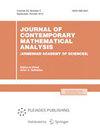与Schrödinger算子相关的Riesz变换的一些估计
IF 0.4
4区 数学
Q4 MATHEMATICS
Journal of Contemporary Mathematical Analysis-Armenian Academy of Sciences
Pub Date : 2022-11-15
DOI:10.54503/0002-3043-2022.57.6-81-94
引用次数: 0
摘要
抽象Let $$\mathcal{L}=-\Delta+V$$ 是Schrödinger的操作员 $$\mathbb{R}^{n},$$ 在哪里 $$n\geq 3,$$ 非负电位 $$V$$ 属于反向Hölder类 $$RH_{q}$$ 有 $$n/2\leq qSome Estimates for Riesz Transforms Associated with Schrödinger Operators
Abstract Let $$\mathcal{L}=-\Delta+V$$ be the Schrödinger operator on $$\mathbb{R}^{n},$$ where $$n\geq 3,$$ and nonnegative potential $$V$$ belongs to the reverse Hölder class $$RH_{q}$$ with $$n/2\leq q
求助全文
通过发布文献求助,成功后即可免费获取论文全文。
去求助
来源期刊
CiteScore
0.70
自引率
0.00%
发文量
32
审稿时长
>12 weeks
期刊介绍:
Journal of Contemporary Mathematical Analysis (Armenian Academy of Sciences) is an outlet for research stemming from the widely acclaimed Armenian school of theory of functions, this journal today continues the traditions of that school in the area of general analysis. A very prolific group of mathematicians in Yerevan contribute to this leading mathematics journal in the following fields: real and complex analysis; approximations; boundary value problems; integral and stochastic geometry; differential equations; probability; integral equations; algebra.

 求助内容:
求助内容: 应助结果提醒方式:
应助结果提醒方式:


